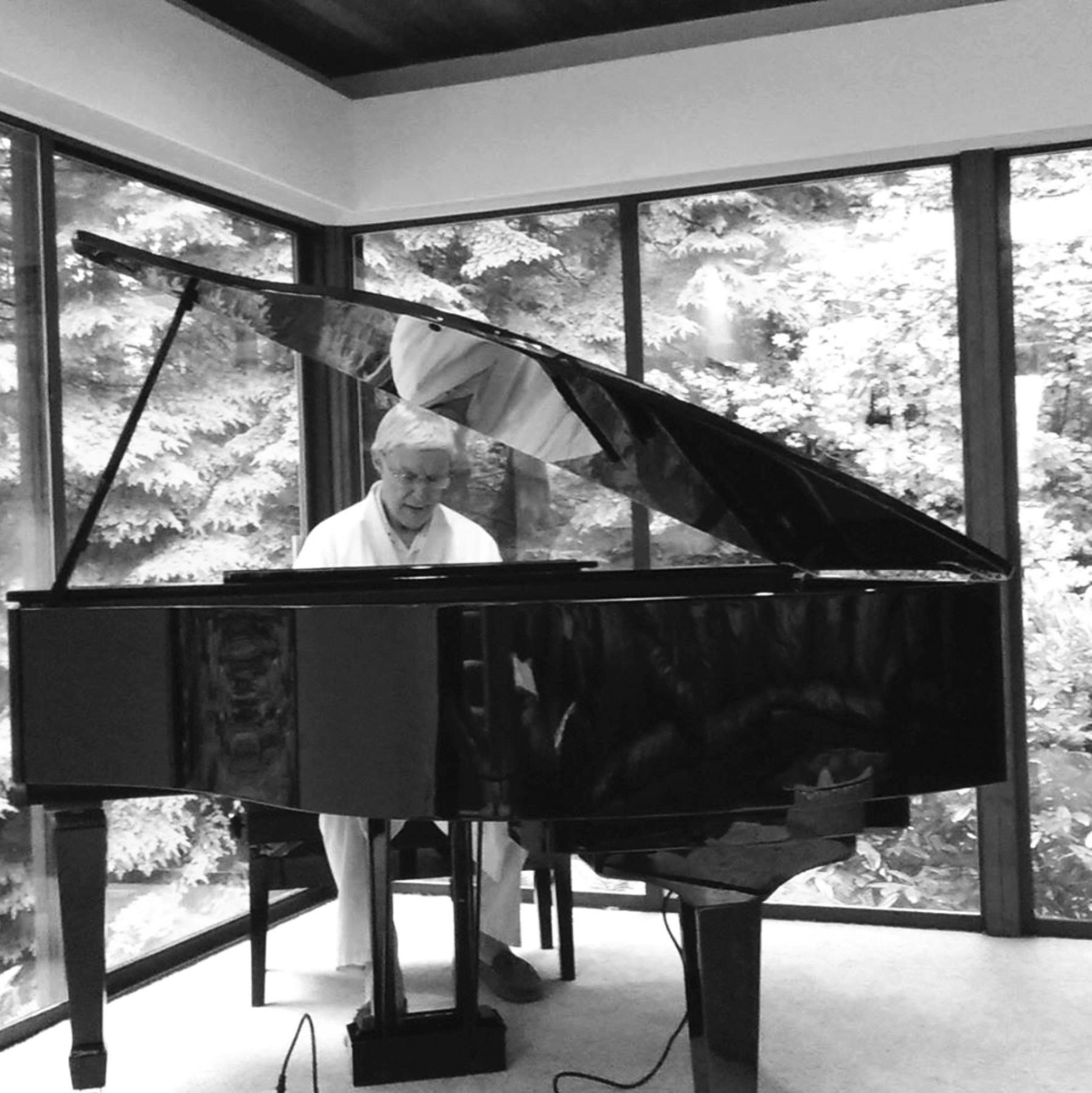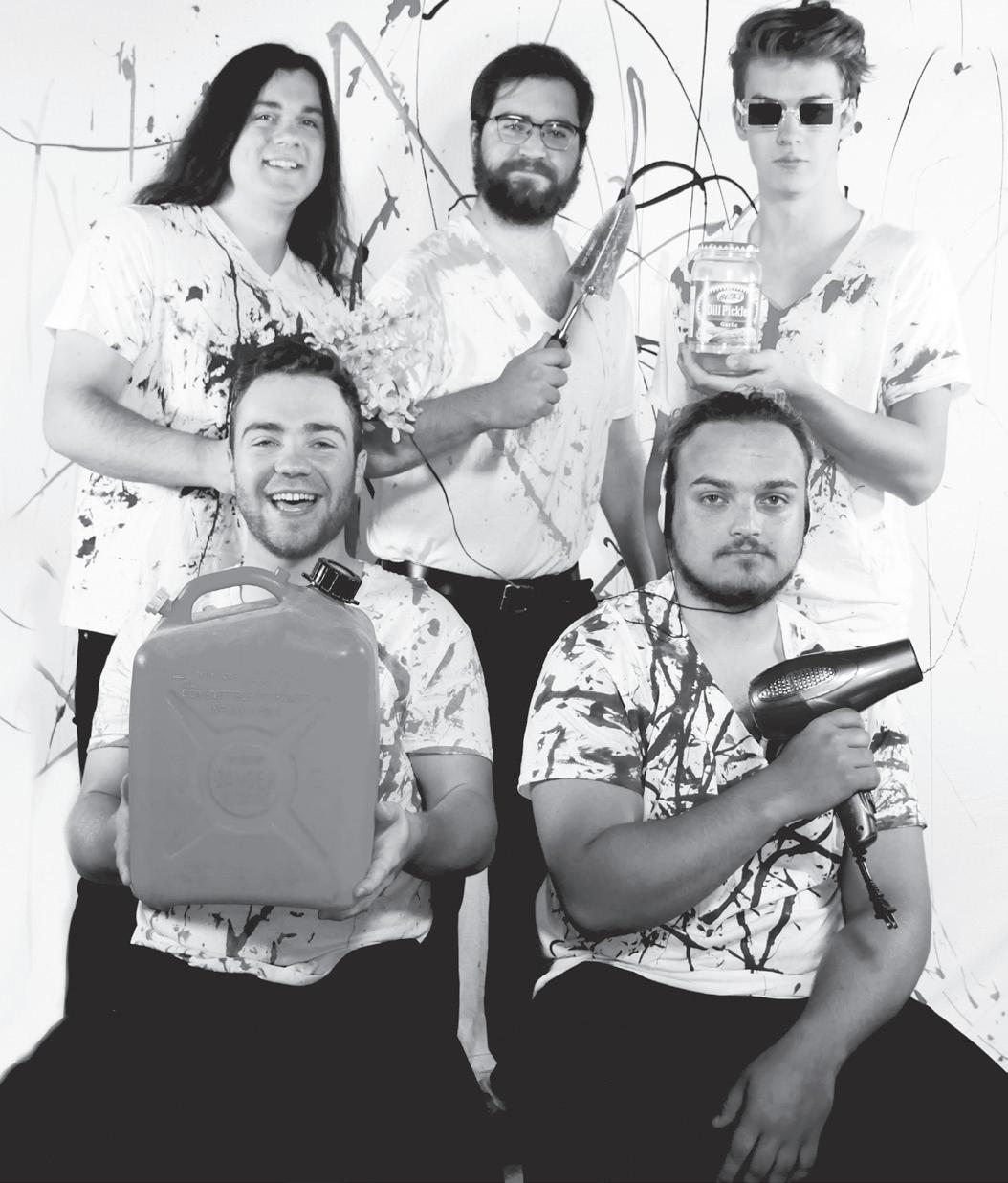
12 minute read
Album Reviews: Jamboree, Baseball Hero, KAINA, and more
JAMBOREE ROOM
In an age where music is engineered to ensure at least thirty seconds of playtime – the necessary amount to be paid out through Spotify – beginning an album (even an EP) with a spoken word track is risky, yet Jamboree’s Room pulls it off with unflinching confidence.
Advertisement
“Distance” opens with an upbeat drum and bass hook that leads directly into monotone prose-poetry exploring notions of malaise, loneliness, and anxiety which foreshadow the motifs that ground the rest of the album.
It is difficult to maintain reasonable expectations when an album starts like this. Six songs of droning vocals make for a listening experience that isn’t exactly engaging, but the rest of Room turns out to be a string of denied expectations, and nothing if not sonically diverse. Throughout the next five songs, Jamboree eschews many major genre classifications and pulls influence from a range of bands spanning decades. The second track “Change” is a nineties power-pop powerhouse akin to early Weezer, discussing the discomfort of self
KAINA NEXT TO THE SUN
Next To The Sun, the latest release from Chicago-based musician consciousness, but even this style is short-lived. Track three surprises with eighties heavy synth and shoegazey vocals. The next relies on keyboard melody and understated Morrisey lyrics, and the rest similarly refuse to follow any discernible thematic link.
This is not to say that the EP feels disjointed (although the introduction of auto-tune in “Pick Your Brain” was a bit too far afield for my taste), Jamboree’s ability to showcase their diversity while preserving a pleasing flow is a talent unto itself. In a short 20 minutes Room exposes the spectrum of sounds that the band has to make use of. It is an impressive range fitting for the extensive catalogue they have released over the last couple of years, and I look forward to watching their growth and promising future. Mark
Teague
BASEBALL HERO SALVATION MOUNTAIN
I don’t think any new, quarantine released music has made me as nostalgic for late nights spent dancing than this EP. I can close my eyes and see myself, dancing, arms wrapped around my friends, smiling. Baseball KAINA (pronounced Kah-e-na), is an exploration into the struggles the artist has faced growing up as a firstgeneration Latina, born and raised in the United States. Her Venezuelan and Guatemalan background influences not only her musical styles but also her lyrics, which are honest and hopeful, keeping the listener open to the reality of her life experience throughout.
KAINA’s previous EP releases, Sweet ASL in 2016 and 4U in 2018 were musically similar but did not have the same openness lurking in the lyrics. Compared to Next To The Sun, those EPs feel like the artist was just dipping her toes in the water to see who was
Ulteriors
Hero has brought me back to a time I had almost forgotten and I couldn’t be happier about it.
Baseball Hero released their newest EP, Salvation Mountain, on September 2nd, 2020. The EP is really beautiful. It is named after the infamous “Salvation Mountain” in Slab City, Southern California, with a photograph of the iconic art piece as the album art. The album is a mixture of happy and sad music that could emanate from the Mountain. It’s the perfect accompaniment to this weird period of endless quarantine. The songs are a space for venting, as well as finding new peace and normalcy despite the limitations of our new world. It feels like the art we all needed that expresses how we feel being isolated from each other all over.
Most of the songs start slow and gentle with really soft vocals, then eventually get loud and rowdy. The instruments clash and collide symbiotically. It works as carefully orchestrated and intertwined chaos. It feels like the inner screams and turmoils of a quarantine day. A day that starts out normal and easy, then clashes and collides, and then carries on and moves wonderfully. The songs are nostalgic, sad, dreamy, a mix of reality and inner turmoil, all while being very fast and irresistibly danceable.
The longest song on the album, “Modern Death/Wish it Was” seems to speak on this new adjustment we are dealing with. A new reconfiguriguration of life as we know it. The song works wonderfully for small scale life changes, as well the mass changes we are seeing today. The lyrics preach for escaping, “when I was listening before really opening up about who she is.
The album starts with “House.” The track builds gradually, using different reverbs and effects, putting the listener in a trance of anticipation before a single word has been sung. We hear a voice humming, inviting us to come closer. Finally, an ethereal voice invites the listener to know her struggles. The opening line “You with your walls, you’re so proud / You stay so happy keeping all us out” is such a poignant first hand account of what so many people feel not just in the U.S., but universally. “All this divide, it ain’t so healthy / There’s room for plenty,”
a little kid I dreamt I could climb a set of stairs into the sky,” with the intense, fast paced instrumentals.
The song ends with what may be the mantra of 2020, “Lean into the feeling that nothing is the same, though I wish it was.” The song ends with an echoing of “I wish it was”. It feels sad but relieving in the optimism and upbeat style of the instruments. The song and the lyrics are cathartic, as they are a conjuring and release of the overbearing stress and panic of the times.
The album’s title track is a wonderful coming together of forces that switch from loud to mellow. It leaves the listeners swaying slowly to suddenly flailing. It’s a beautiful song, with the lyrics, “Let’s gather on Salvation Mountain, Before the Rapture takes us.” The song is a wonderfully joyous call for coming together in these especially apocalyptic times. The song, and the album completely, reminds us of the silver linings, the happiness underlying the bleakness of the times.
Baseball Hero’s new EP is exceptionally poignant and a great quarantine listen. It’s sure to parallel some of your own anxieties. It might even make you feel some sense of transcendence from the uncertainties of the future. Hopefully, one day soon, we can all be gathered again in a dark room to hear this album live and loud. There won’t be a dancing restriction and we can move and sway together, rejoicing, singing along to “Salvation
Mountain”. Lily O’Donnell she summarizes in the chorus. The song sets the tone for the album in its honesty, but it also sets the listener up to know the lyrics are going to be introspective.
My stand-outs on the album are “What’s A Girl” (delivered in a style reminiscent of Fiona Apple) and “Joei,” which opens with a conversation between (presumably) KAINA and a child about having a crush on someone and keeping it a secret if they don’t feel the same way before KAINA’s voice asks “Am I a secret?” I love the perspective shift from the secret keeper to the sudden realization that all of us could be someone else’s secret. The
closing track, “Green,” is my favourite on the album. The beat is irresistible as she sings about all of the people who came before her, and the line “But know me for my truth” really sums up the album. As KAINA said in an interview with Pitchfork, “you can’t be a vessel for good if you’re not being honest.” Grace Hrabi
SEN MORIMOTO SEN MORIMOTO
On his self-titled sophomore album, multi-instrumentalist Sen Morimoto offers a slick fusion of jazz-rap and soulful art-pop, mixing in various elements from across the musical genre spectrum along the way. The Chicago artist’s background of saxophone is made clear right away, on the opening track “Love, Money Pt. 2,” as well as his knack for a funkier sound, like on the track “Deep Down.” The guitar and keyboard sounds differ on nearly every song, making for a genuinely engaging sound that remains hard to pin down. Guest vocals from NNAMDÏ, Joseph Chilliams, and others only add to the colourful nature of the record. The broad range of influences and varying sounds make for a dynamic listen, and Morimoto still manages to tie the record together with a certain cohesive moodiness that can be found on every track. This album will pull you into the artist’s mind, as if slipping into a dream. The introspectiveness and vulnerability of the lyrics give the impression that Morimoto is an old friend, forging a bond between listener and artist from the first listen. From the nonchalant flows delivered on “Save” to the woeful desperation on the song “Woof,” there seems to be a grey cloud hanging over Sen and his music, that makes every joyful moment seem like an exception. This is not to the detriment of the album however, as it properly sets a tone for the record rather than leaving the listener guessing. The songs themselves are not always sad, but the general melancholy and tones of regret in Sen’s lyrics and voice give the impression that he is perhaps still healing, on a journey to being better, a quality reminiscent of Mac Miller’s later work. Though it may seem that the lyrics and the music tell different stories, the contrasting sadness of Morimoto’s voice and subject matter, and the sheer beauty and colour of the instrumentals makes for a striking combination. Sen Morimoto proves that melancholy can be a vehicle for creativity and charm as it transitions to hope. Olivier LaRoche
LAND OF TALK
INDISTINCT CONVERSATIONS
Indistinct Conversations, the latest release from Toronto’s Land of Talk seems, from the outset, to be the kind of dreamy folk album that typifies mid-afternoon festival stages in the hot sun. “Diaphanous,” the first track, is a fitting title to describe not only the song, but the overarching sound of the album. Yet, as the tracks maintain a pronounced lightness, the content begins to reveal a complexity that is not fully realized until the final songs.
Elizabeth Powell’s breathy vocals have a surprising range that she applies as the album turns to become more introspective, beginning with “Weight of that Weekend.” The song opens with what sounds to be an angry voicemail message, and steers the listener into considering the relationship between the term Indistinct Conversations and the themes of interpersonal disconnect that are explored throughout the album.
The last two songs – “Now you Want to Live in the Light” and “Indistinct Conversations” diverge from the rest, introducing elements of dissonance and resolution that pair well with the emergence of a more explicit lyrical frustration than was found in the preceding tracks. The final song begins with the sounds of wind through a telephone and relies on recorded small talk instead of sung vocals. This choice dramatically changes the rest of the album, as it explores the juxtaposition of literal and figurative miscommunication found not only in dialogue, but also in inner monologue. It compares the difficulty of communicating with others as well as with ourselves, and sheds new light on the earlier songs by exposing common troubles in expression.
Elizabeth Powell, through Land of Talk, takes a familiar and comforting pairing of folk-influenced guitar and warbling vocals and uses it to explore the nature of relationships and emotion. Indistinct Conversations, when experienced in its entirety, is an unexpected but timely meditation in an age of uncertainty. Mark Teague
HEAPS WHAT IS HEAPS
With their debut LP, Ontario band Heaps deliver a pleasantly crafted and versatile indie-rock sound. Very much a continuation of the indie-rock trends that defined the 2010’s, their sound lies somewhere between the music of Foster the People and that of The Killers. Endlessly catchy vocals and riffs define this record ensuring a foottapping experience during every listen. Apart from the tasteful riffs, the guitar work manages to keep the familiar indie rock tone and shape, sometimes with heavier distortion, like at the end of the track “Softly,” that adds another dimension to the sound. The group also makes use of creative time signatures in some songs, such as on the closing track “Someday,” proving to be a feature that sets them apart from many other acts in the same vein who tend to stick to simpler rhythms. Similarly to the music of their contemporaries, the mood of many songs on What is Heaps are reminiscent of scenes from a coming-of-age film. That being said, the genuine tone of the vocals and lyrics gives a sense of “these guys are for real,” and eliminates the possibility of any Hollywood cheesiness that may accompany such a narrative. This narrative is not simply a sporadic moment across a few songs, either. The entire album flows with a certain smoothness that uncovers a story told through their entire sound, beyond just the lyrics. There is also a certain versatility in their songwriting that allows for both a satisfying listen from front to back, and for songs that hold their own. This is an important feature, especially in the streaming age, where songs hold more weight on their own than ever. Many people tend to add only a few songs from an album to their playlists or library, and that may certainly be the case with What is Heaps. However, the option of listening to the album all the way through, whether it’s on Spotify or from a vinyl LP, remains viable, an extremely underrated feature in today’s

musical climate. Olivier LaRoche
LIÉ YOU WANT IT REAL
Coming out of the ferocious Vancouver punk scene, Lié dives headfirst into a chaotic, exciting, and confident album, which brings the listener into a world of tight-knit thrash-punk, ushering you along an energetic journey. At the same time, you try and hold on for dear life.
Heavy bass lines drive many songs on You Want it Real, while the guitar and drums work symbiotically to produce an unconstrained yet simultaneously steady album. The band sounds as good as ever, and you can feel the creative compatibility between the band members as they effortlessly bounce between meticulously crafted tracks.
From the first track, “Digging in the Desert,” you can feel the band’s unrelenting power. Singing through impressionist metaphors, lead singer and bassist Ashlee Luk yells, “I’ve been wasting all my precious time digging, digging in the desert,” before yelling at the song’s antagonist, “You’re so righteous.” Lié don’t waste any time proclaiming their hostility towards a society so oppressive to those pushed furthest to the margins. A feeling of discontent and call for change run through the album and display the discharge of that rage in classic hardcore fashion.
You can feel that energy explicitly on “Bug.” The band bounces back and forth between sludgy metal riffs and fast-paced Anarcho-punk, further displaying their disillusionment toward society. At the same time, “You Got It” transports you to a vicious moshpit where you can practically feel the punches flying and taste the metallic flavor of blood running down from your broken nose. They might not be reinventing the wheel, but Lié shows precisely how great deliberate, voracious punk music can be. Myles






